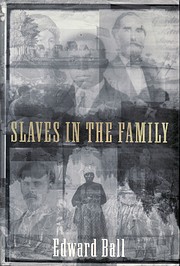

Fai clic su di un'immagine per andare a Google Ricerca Libri.
|
Sto caricando le informazioni... Slaves in the Family (originale 1998; edizione 1998)di Edward Ball
Informazioni sull'operaSlaves in the Family di Edward Ball (1998)
 Sto caricando le informazioni...
Iscriviti per consentire a LibraryThing di scoprire se ti piacerà questo libro. Attualmente non vi sono conversazioni su questo libro. Several generations of author Edward Ball’s South Carolina forebears were large slave-holding rice planters. Ball grew up hearing stories about the family’s past, and as an adult he became interested in locating descendants of persons who had been enslaved by the Ball family, at least some of whom were likely related to him by blood. Many of the Ball family papers survive and are dispersed among several archival repositories. Ball was able to trace several slave families back to the first African arrival. Had Ball written this book just a decade or so later, it might have looked quite different. Genealogical DNA testing companies were in their infancy at the time Ball was writing this book. DNA testing might have confirmed Ball’s suspicions about the paternity of some of the persons enslaved by Ball family members. Several years later, Ball wrote The Genetic Strand in which he uses DNA to explore family mysteries. I want to read this book to see if it sheds more light on the lives of those who are profiled in Slaves in the Family. This is an important book for many reasons. The author wrestles with the legacy of slavery for both descendants of enslaved persons and descendants of their enslavers. It’s also a history of rice plantation culture, a history of Charleston, and a history of South Carolina during the Revolutionary and Civil Wars. I found it a little hard to follow as the structure is only somewhat chronological. The chapters alternate between a chronological history and contemporary memoir of Ball’s meetings with descendants of Ball slaves. I noticed quite a bit of repetition in the narrative that ought to have been edited out of such a long book. I read the paperback edition, from which the author’s account of his visit to Africa has been removed. Moving and eye opening. He's very successful at telling the history of these families together rather than the isolated saga that his family history had been. The notion of the patrimony that his family cherishes being bought by ripping other people away from their own history is Tragic. I didn't always like his adjectives but appreciated how he kept control of the emotional tone of the book. Ball's engrossing text revealed my incredible ignorance about slavery in America. Since childhood, I've had this mental image of white men walking through African jungles and knocking native Africans on the head and loading them on ships. I was totally unaware that selling slaves was an African business that made its black merchants wealthy. Since publication of Slaves in the Family, television documentaries and other books have brought the truths of slavery in America into homes and schools. Ball traveled to Africa and interviewed the still-wealthy descendants of African slave merchants, spoke to the descendants of slaves in America, and met with his black DNA cousins who descend from Ball's own slave-owner ancestors. This is certainly one of the most important books ever published about slavery in America. nessuna recensione | aggiungi una recensione
Premi e riconoscimentiElenchi di rilievo
Journalist Ball confronts the legacy of his family's slave-owning past, uncovering the story of the people, both black and white, who lived and worked on the Balls' South Carolina plantations. It is an unprecedented family record that reveals how the painful legacy of slavery continues to endure in America's collective memory and experience. Ball, a descendant of one of the largest slave-owning families in the South, discovered that his ancestors owned 25 plantations, worked by nearly 4,000 slaves. Through meticulous research and by interviewing scattered relatives, Ball contacted some 100,000 African-Americans who are all descendants of Ball slaves. In intimate conversations with them, he garnered information, hard words, and devastating family stories of precisely what it means to be enslaved. He found that the family plantation owners were far from benevolent patriarchs; instead there is a dark history of exploitation, interbreeding, and extreme violence.--From publisher description. Non sono state trovate descrizioni di biblioteche |
Discussioni correntiNessunoCopertine popolari
 Google Books — Sto caricando le informazioni... Google Books — Sto caricando le informazioni...GeneriSistema Decimale Melvil (DDC)975.79150099History and Geography North America Southeastern U.S. South CarolinaClassificazione LCVotoMedia: (3.92) (3.92)
Sei tu?Diventa un autore di LibraryThing. |
||||||||||||||||||||||||||||||||||||||||||||||||||||||||||||||||||||||||||||||||||||||||||||||||||||||||||||||||||||||||||||||||||||||
I would reccommend this book! (